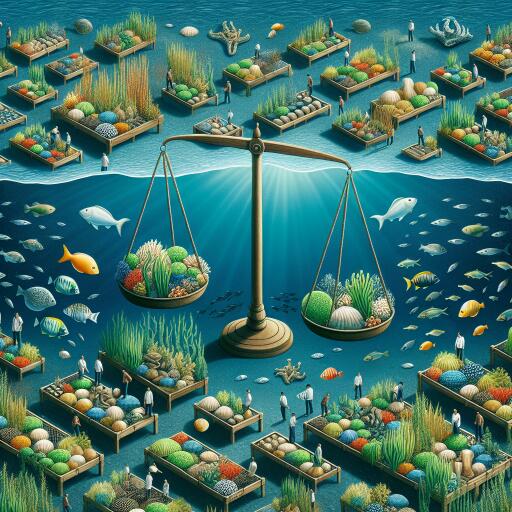Sustainable Mariculture: Striking a Balance Between Human Needs and Marine Conservation
At a significant gathering in Quảng Ninh province, a pivotal discussion unfolded, emphasizing the vital balance required between harnessing mariculture potential and preserving ocean resources for a sustainable future. This conference, spearheaded by the Ministry of Agriculture and Rural Development (MARD) alongside the Quảng Ninh Provincial People’s Committee, drew experts from various fields to deliberate on the sustainable development of mariculture.
Quảng Ninh, renowned as a dynamic growth hub within the Hồng (Red) River Delta region, boasts a robust socio-economic and transportation framework. The province has impressively maintained a Gross Regional Domestic Product (GRDP) growth rate exceeding 10% annually, leading the Red River Delta and ranking impressively in the northern region. “Quảng Ninh envisions the establishment of a blue ocean economy, focusing on the sustainable utilization of marine resources to foster economic growth, enhance community well-being, and safeguard marine ecosystems,” highlighted Nguyễn Xuân Ký, Secretary of the Quảng Ninh Provincial Party Committee.
Ký further outlined the province’s ambitions to evolve into a premier marine economic center in Southeast Asia. Central to this vision is the development of specialized farming, which aims to leverage the province’s substantial tourism draw of over 20 million visitors each year for both local consumption and export. This plan includes adeptly merging aquaculture practices with cutting-edge, efficient, and sustainable seafood exploitation methodologies.
Lê Minh Hoan, Minister of Agriculture and Rural Development, underlined the mariculture industry’s responsibility in addressing social issues by generating livelihoods and employment. He advocated for seamless coordination between government entities, the business sector, international experts, and professional bodies to realize this industry’s full potential. Utilizing its well-established infrastructure and technological capabilities, Quảng Ninh has already set a precedent by initiating over 100 marine cooperatives, blending high-tech mariculture with experiential tourism aspects.
Minister Hoan called for MARD’s active engagement with other ministries to promote and explore seafood farming and processing, emphasizing the importance of expanding research and international cooperation in marine economy and science and technology endeavors.
Hilde Solbakken, the Norwegian Ambassador to Việt Nam, highlighted the rich seafood export heritage shared by both Norway and Việt Nam, noting the bilateral exchange of knowledge and experiences as a gateway to valuable opportunities for both nations. The ambassador envisioned that Norway’s sustainable mariculture practices could serve as a model for Việt Nam, fostering economic benefits and solidifying diplomatic ties.
Việt Nam’s Prime Minister, Phạm Minh Chính, has endorsed a marine aquaculture project that outlines ambitious goals up to 2045, including significant expansion in marine aquaculture zones and substantial increases in output and export turnover. This project aspires to deploy advanced technology and modern management in marine farming, highlighting the country’s commitment to promoting biodiversity and leveraging resources across various industries for an ecologically balanced approach to marine farming.
Theconference also aimed to address and discuss the myriad challenges faced by the sector, including policy limitations, technological advancements, investment needs, and the crucial issuance of farming area codes for sustainable development. By fostering a collaborative environment for stakeholders to share insights and experiences, the event sought to pave the way for overcoming these challenges and unlocking the potential of Việt Nam’s marine economy.
Việt Nam’s strategic positioning, bordered on three sides by the sea, offers remarkable natural advantages for marine economy development, including mariculture. Recognizing this, the government and MARD have prioritized the sector, aiming to harness its full potential while navigating the intricate challenges associated with sustainable growth.
This gathering underscored the importance of collaboration, innovative approaches, and shared visions in achieving a balanced and sustainable mariculture sector that not only meets human needs but also preserves the invaluable resources of the sea for future generations.
